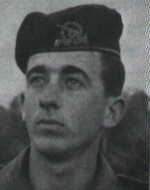Guttman Ron (“Roni”)
The son of Edek and Nechama. He was born on October 5, 1950 in Kibbutz Gazit in the Lower Galilee. He was one of the first members of the kibbutz, studied at the kibbutz elementary school and at the “Tavor” educational institution in nearby Kibbutz Ein Dor. He was a talented and sensitive boy, very shy and quiet. He always used pleasant ways among his friends and did not look for a reason to stand out. He worked very hard in the movement to eradicate illiteracy, and was aware that he could do for the new immigrants. He was also a member of the Ha – Shomer ha – Tsa’ir youth movement. He was one of the editors of the Mossad newsletter, which he had given him from his wit and sarcastic humor. But at the same time revealed some of his lyrical soul in short poems he wrote. In these poems he discovered depth of vision, a feeling of emotion and joy of life. Ronny had a strong will. Did not succumb to the illness that struck him as a child and did not abstain from any sports activity. He participated regularly in the traditional Tabor races and in the Sea of Galilee. Everyone admired him for his diligence and perseverance in various types of activity. He was loved by both children and adults. He liked to be Simcha, sang in the choir and played the flute. He contributed most of his talents to parties and his orchestras were sung by his peers on various occasions. Ronnie was a wonderful mixture of desire and emotion, passion and intelligence. This was when he was chosen to serve as a guide: a graduate between adults, from one person to another, helping all those who demand it and always ready for cultural and social activity, for current debates, for striving, which was not always with the current, but sought its uniqueness. Ronny knew how to activate the great powers inherent in him; he did not give up, repeated time and time again until he improved his achievements. Changed, corrected, but always remained that cute young man who knew his weaknesses and looked for ways to respond to his friends’ inquiries, to help, to advance things in his work with the herd of sheep, in interpersonal relations, in solving questions that sometimes seemed insoluble. At the beginning of November 1969, Roni was drafted into the IDF, and he completed his basic training as an outstanding soldier, with excellent qualities and a quiet and calm face that quickly created a bond of sympathy and understanding between him and his comrades. Dreamed of the day when he could return from the camp and from training, to contribute actively to the life of the kibbutz, to try to correct flaws, to be a catalyst for a better and more Yaffa life. He fell while serving in the enemy’s shelling of the Golan Heights, and was promoted to Corporal. He was laid to rest in the cemetery at Kibbutz Gazit. The commander of the unit wrote to his family: “Ronny arrived at the unit relatively recently, about two months before his fall, and Ronny completed his training as a soldier in the Artillery Corps. – – – Immediately absorbed in the unit and his great devotion quickly reached the position of deputy commander of the staff of the ITC, a position which he filled when they fell. – He also provided assistance and cover to the armored forces that moved eastward on the border, in order to take control of the Syrian posts that harassed our settlements and the civilian movement on the Golan Heights. In his body, Roni rode the forces and sacrificed his soul so that his friends could work safely and without casualties. His devotion, courage, and joy of life will always be engraved in our hearts. His image will accompany us and give us the strength and the courage to continue the burden of the war forced upon us by our enemies. “The kibbutz decided to commemorate the memory of Roni, the son of the friend, by erecting an arm near the memorial corner, dedicated to the memory of the parents of the kibbutz members who perished in the Holocaust.Modest, some of his Yaffa songs were assembled; A pamphlet in his memory, called “Roni” in his name, is an emotional and painful farewell to a dear son who has not been able to see how his dreams come true in the reality of his kibbutz life.
